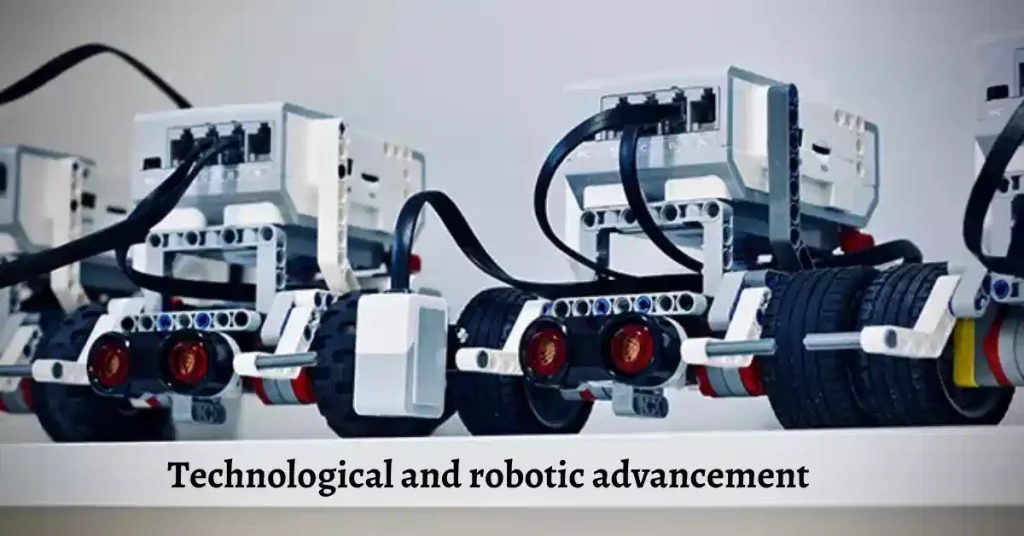Explore 10 professional roles that, in the future, robotic machines will transform to learn more about the fascinating world of technology connected all around. Automation and artificial intelligence are changing sectors and posing new challenges to professionals across the globe.
Introduction
Automation staff and robotic machines are now more common across various industries because of the quick technological improvements. Although there are many advantages to these technological advancements, some job sectors are also at risk due to robot engineer jobs. In this post, we’ll talk about ten occupations that risk becoming automated staff by technology and being replaced by robot engineer jobs.
Technological and robotic advancement

Robotics has advanced significantly in recent years thanks to technological advancements. The future of artificial intelligence, robotic machines, and sensor technology connect robots to execute challenging jobs. These impact machines can perform tasks precisely and effectively, frequently outperforming humans. As a result, businesses have begun integrating robots into their processes, which could result in the loss of jobs.
Jobs at Risk of Robot Replacement

1.Workers on production and assembly lines
Manufacturing is among the industries most at risk from automation. Robotic machines may eventually replace humans working on assembly lines for repetitive chores. Because these impact machines can manage complicated production procedures, organizations will see increased productivity and lower personnel expenses.
2. Workers in data entry
Workers who manually enter information into systems are also in danger. Using robot engineer jobs, data input processes can be automated with accuracy and efficiency in mind. This technology may process Large amounts of data quickly, requiring less human involvement.
3. Truck drivers
The transportation business could be significantly impacted by autonomous cars. Industrial travel jobs can be accomplished by autonomous trucks. While it might take some time before truck drivers are entirely replaced, the field is threatened by advances in autonomous technology. Industrial travel jobs are at risk due to robotics.
4. Cashiers
Self-service kiosks and automated checkout systems are becoming more prevalent in retail settings. Because customers can now scan and pay for their products independently, these technologies minimize the need for human cashiers. As more stores use self-checkout services, cashiers may lose their jobs due to robotic machines.
5. Customer service agents
Chatbots and virtual assistants powered by artificial intelligence are revolutionizing customer support processes. These computerized systems can answer customer questions, offer advice, and even complete transactions. While human customer service agents are always required for complex issues, AI can readily undertake everyday duties.
6. Banking Tellers
Automation has also advanced in the banking industry, replacing bank tellers. Customers can conduct transactions remotely through ATMs and mobile banking applications. The need for human tellers could decrease as these technologies advance.
7. Telemarketers
Automation threatens the telemarketing industry, which depends significantly on making outbound calls. Businesses can cut costs by using automated telemarketers to perform routine sales calls. However, human sales reps will still be necessary for more complicated and individualized sales transactions.
8. Automation staff
Robot engineers with natural language processing capabilities can welcome guests, respond to their simple inquiries, and point them toward the correct departments. Particularly in large enterprises, this technology connection lessens the need for human receptionists.
9. Security Officers
Robotic security guards are becoming a practical substitute thanks to improvements in surveillance technologies and AI-driven facial recognition software. These impact machines can patrol buildings, spot potential dangers, and notify automation staff when necessary. The number of roles for human security guards may remain the same as robotic security guards are deployed.
10. Farmers and farm employees
Another industry embracing automation gradually is agriculture. Planting, harvesting, and crop health monitoring are just a few of the agricultural duties that robot engineer jobs can handle. The extensive use of robotic systems may impact the workforce, even though some specialized agricultural tasks still require human interaction.
The Effects of Automation on Employment
Undoubtedly, the job market will be significantly impacted by the rising use of impact machines like robots and automated technologies in the workplace. While automation destroys some work roles, it also opens new career paths. To succeed in a world driven by technology, people, and industries must adapt to these changes and develop the skills necessary for new employment responsibilities.
Adjusting to a Shifting Landscape
People must embrace lifelong learning and build abilities resistant to automation as technology connects rapidly. Jobs requiring critical thinking, problem-solving, emotional intelligence, and creativity are less likely to be entirely replaced by robots. Individuals can future-proof their jobs and maintain marketability by concentrating on these topics.
In summary
The future of some work roles still needs to be discovered as technology develops at a never-before-seen rate. Robotics and automation will likely revolutionize several industries and eliminate some occupations due to their integration. People and communities must be ready for these changes by adopting new skills machine net and adjusting to the changing employment market. We can exploit the advantages of technology and navigate the future with certainty if we do this.
FAQs
- Will robots eventually take over all human jobs?
No, in the future, robots won’t take over all of the occupations. Even though automation will affect some professions and industries, there will always be a demand for people with creative, analytical, and emotional intelligence talents.
2. How can people prepare for the shifting job market?
By emphasizing the development of less susceptible talents to automation, people can get ready for the changing nature of the work market. This includes creativity, critical analysis, problem-solving, and emotional intelligence abilities.
3. What new work roles are there in today’s technologically advanced world?
Data scientists, experts in artificial intelligence, cybersecurity, user experience designers, and digital marketing are among the professions emerging in the technology-connect-driven world. Technical proficiency and creativity are needed for these positions.
4. Can robots entirely take the place of human workers?
Some tasks still need human involvement, even though robots and automation can replace some work roles. Complex decision-making, empathy, and creative jobs are less likely to be entirely supplanted by robots in the workplace.
5: How can businesses adjust to the rise of automation?
By adopting new technology, retraining their employees, and focusing on tasks that require human talent, industries may adjust to the rise of automation. Collaboration between humans and robots can boost output and efficiency across various sectors.







